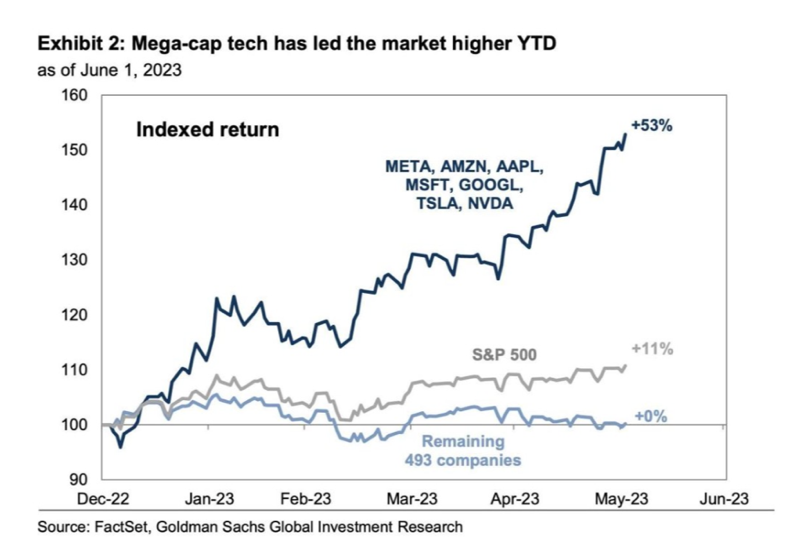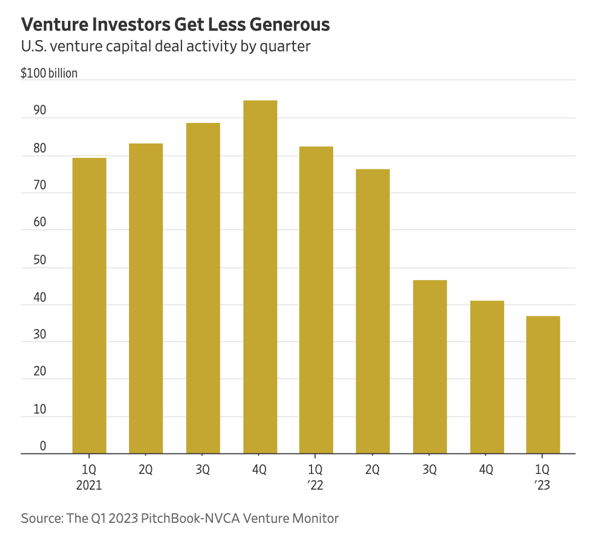postcards from the florida republic
A few weeks ago, Deere (DR) and PepsiCo (PEP) took part in an AI conference showcasing the role of the tech in future operations.
For months, media reported that AI would "unleash incredible profits for companies." S&P 500 stocks would require fewer workers. AI would unleash profitability and expand margins.
But after that conference, no cyclical or industrial company that presented at the event rallied the way that NVIDIA (NVDA) or Amazon.com (AMZN) has since the start of January.
Not one.
Meanwhile, Syz Group notes that just seven stocks have increased this market in 2023. And Microsoft (MSFT) now holds a market weight in line with the bottom 50 companies combined in the Nasdaq 100.
The chart below shows that mega-caps surged 53% through June 1, compared to the 11% return for the S&P 500, and the flat return for the rest of the index. And that’s before the markets took off like a rocket in the last two weeks.
 Headlines would suggest the rise is solely due to sentiment around artificial intelligence (AI).
Headlines would suggest the rise is solely due to sentiment around artificial intelligence (AI).
But what if there’s a factor that everyone is overlooking?
The other factor at work here is the Fed factor - those anti-competitive, destructive policies I mentioned a second ago.
Their competition - NVIDIA'S and Amazon's - has imploded… and higher interest rates have created a series of anti-competitive situations that should only fuel optimism in the Great Technology Oligarchy growing out west.
Growing and changing like a malignant fungus…
Thank The Fed for the Big Tech-Government Alliance
Low- and zero-interest-rate policies of the past 15 years fueled the ballistic rise of Big Tech. That rise enabled some players to run amok… to play fast and loose with right and wrong.
We’ve witnessed tech executives engage in widespread surveillance practices, media suppression, and other government-sanctioned activities.
That apparatus didn’t emerge spontaneously or by accident.
One might believe that Big Tech’s origins arrived on the back of breakneck growth and product innovation. That's what the Hype Machine says, at any rate.
That hype makes it all too easy to overlook a key player in the rise of the Great Technology Oligarchy…
The Federal Reserve. Just look at what they've done.
Monetary Policy Has Favored Tech Oligarchs for 30 Years
In 1993, the central bank, under Chair Alan Greenspan, began the practice of “inflation targeting” to offset deflation fueled by technology born in the first iteration of the internet Web 1.0.
The Fed’s monetary practices have papered over deflation with cheap money, lower interest rates, and all the consequences that favored this peculiar kind of industrialization.
Following the Dot-Com Bubble, survivors enjoyed lower interest rates and cheap capital. So too did investors, who accelerated investment in risk assets despite the dramatic internet crash of 2001-2002.
The Federal Reserve turned the dial up to 11 - maximum overdrive- on these cheap money practices after the 2008-09 financial crash.
For roughly 13 years, lower interest rates provided legacy names like Alphabet (GOOG), Amazon, and Facebook (META) with access to cheap capital. This allowed them to borrow for expansion, to buy competitors (see Facebook’s purchase of Instagram) and fund their explosive growth plans.
In addition, companies could borrow on the cheap and buy back stock, setting a precedent that boosted earnings per share and increased the value of their stock. Investors – also aided by cheap money and low rates – chased these stocks higher.
Decades of cheap money cash flow advantages enabled these scaling tech giants to expand beyond their core businesses.
Remember, Amazon, Alphabet, Microsoft, and other leading names didn't start out angling for artificial intelligence dominance.
Amazon started as an online bookstore. Today, Amazon Web Services is a major player in government contracts, fueling most of the Internet - the entire Internet. Amazon's e-commerce platform dominates all online retail. Its market cap is north of $1 trillion.
Microsoft and Google had similarly modest beginnings and narrow aims - computer operating systems and search engines.
Cheap money has enabled all these companies to buy other businesses, build their own venture capital divisions, speculate, and fail in other business lines (see Amazon’s failed phone experiment).
All the while, they’ve adequately beaten-up venture capital names that aim to disrupt their business models.
After a decade of building conglomerate status across next-generation technologies, they are moving out onto the bleeding edge in other areas of technology: Genomics, artificial intelligence, self-driving cars, and more.
As they establish market dominance in new forms of technology…
It's OK to Feel Sorry for Venture Capital
Venture Capital has imploded over the last 18 months.
Last week, the Wall Street Journal released a distressing analysis. They've found many startups are now unable to secure the funding they need. To say VC has been "suffering" is an understatement.
Tom Loverro, a general partner at VC shop IVP, has said “The Mass Extinction Event for startups is underway.”

Venture capital losses over the last two quarters are key to understanding why those top seven Nasdaq stocks are thriving. Pitchbook Data shows that the annual “internal rate of return” for the 3rd quarter of 2022 hit “negative 7%.”
That’s the worst annualized return since 2009. More startups are closing shop. Others aren’t even getting off the ground as deal activity dries up.
What's more, Silicon Valley is being starved of talent. As brains, literally, evacuate the venture system, they seem destined to take refuge within the walls of these tech fortresses, resulting in a bullish scenario for Big Tech but a bleak outlook for startups.
And so, these tech giants will also benefit in the buyer’s market of human capital.
In addition to winning the human capital race from the collapse of venture capital, there are other competitive advantages that these giants hold over startups and mid-level companies.
Higher interest rates create barriers to entry for new competitors. It becomes more expensive for startups or smaller tech companies to borrow money for expansion or research and development. That disconnect offers big tech firms a competitive advantage due to their capital access and financial strength.
In addition, any big tech giant sitting on a cash hoard will enjoy some other special advantages.
What sort of advantages?
Well, they can buy short-term bonds with cash reserves and other investment portfolios. This boosts profitability, while their smaller competitors flail in the wind in search of capital…
Do these companies have a lot of cash on hand?
Of course. And let’s look at where a lot of cash comes from…
Bad Monetary Policy Can Ruin Competition
Consider another bastardized incentive created by central banking and bad policy. Large tech names like Amazon can utilize their invoice payment strategies to starve out competition.
As I’ve discussed, Amazon doesn’t pay its vendors for 45 days after the company sells a product on its platform. If a vendor files an invoice for June, Amazon has until mid-August to pay.
Amazon is essentially receiving a 45-day, no-interest loan from its vendors. And we’re not talking about peanuts here.
Amazon had nearly $80 billion in outstanding accounts payable at the end of 2022. The bulk of these payable are to vendors.
While small businesses are dealing with higher costs of capital – especially on short-term loans – the business practice of delayed invoicing payments offers a massive competitive advantage over its rivals and the vendors on the platform that sell similar products. If you sell your yoga mat on Amazon, the same day that Amazon sells its own branded mats… it keeps your payment for 45 days… while its payment goes directly into its revenue stash. That will drag on your company’s cash flow.
It's the most-anticompetitive business practice I’ve ever seen.
And Amazon’s accounts payable expands… every single year…
There Used to be Banana Republics - Now They're Silicon
And speaking of anti-competition – let’s discuss the final point of what this ecosystem has produced: The K Street revolving door, politicians making beelines for cushy private-sector gigs, and hundreds of millions spent on regulatory capture in Washington…
Regulatory capture. Imagine a Chinese mining company sliding cash across the desk of a civil servant in Zimbabwe in exchange for writing the rule book their way. Not a big stretch of imagination, right? Well, that’s regulatory capture, and it's happening here in the United States on an unprecedented scale.
Not a nation of laws but of lobbyists.
Apple, Amazon, Alphabet and Meta spent more than $55 million on lobbying the federal government in 2021. That doesn’t mean directly to Congress. The spending is directed toward agencies as well. For them, it’s money well spent.
The Federal Trade Commission has largely ignored anti-competitive practices at most of them (I’ve tried to get them to look at Amazon’s payment practices).
Meanwhile, what is the government focused on stopping right now?
Not big data collection or personal privacy restrictions. The focus right now is on cryptocurrencies – the projects behind decentralized Web 3 – the real disruptive threat to centralized platforms at these tech names.
It's easy to blame anti-competition on ruthless executives.
But all you need to do is follow the money.
It will usually lead you home… back to monetary policy that has created the have-nots and have-yachts over the last 30 years.
So, as I've said before, I can't stand this on a personal level, but it's my responsibility to show you where the opportunity is- not whether it makes me feel warm and fuzzy.
For now, and thanks to the Fed, this is where tech innovation and profits are. It's an ugly neighborhood, but we must be here. Don't short these names when momentum turns against them, rather buy in when the tide is turning their way.
 And for heaven's sake, please don’t shoot the messenger,
And for heaven's sake, please don’t shoot the messenger,
Garrett Baldwin
Florida Republic Capital (Available on Substack)
About the Author
Garrett Baldwin is a globally recognized research economist, financial writer, consultant, and political risk analyst with decades of trading experience and degrees in economics, cybersecurity, and business from Johns Hopkins, Purdue, Indiana University, and Northwestern.



